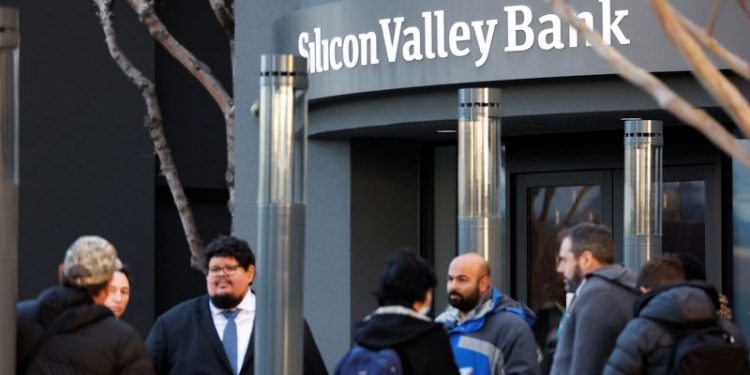By Jonathan Stempel
(Reuters) – The FDIC sued 17 former officers and directors of Silicon Valley Bank on Thursday, seeking to recover billions of dollars over allegations of gross negligence and breach of fiduciary duties that caused the bank’s collapse in March 2023, one of the largest bank failures in the United States.
In a complaint filed in federal court in San Francisco, the FDIC, in its capacity as receiver of the bank, said the defendants ignored the basic standards of prudent banking and the bank’s own risk policies by letting the bank takes excessive risks to increase its short-term profits and its stock price.
The FDIC criticized the bank’s overreliance on unhedged, interest-rate-sensitive long-term government bonds, such as U.S. Treasuries and mortgage-backed securities, while rates looked set to rise – and eventually did.
It also objected to the payment of an “extremely imprudent” $294 million dividend to its parent company, which drained needed capital “at a time of financial difficulty and weak management” in December 2022, less than three months before his disappearance.
“SVB represents a case of gross mismanagement of interest rate and liquidity risks by the bank’s former officers and directors,” the complaint states.
The defendants include former CEO Gregory Becker, former CFO Daniel Beck, four other former executives and 11 former directors.
Becker’s lawyer was traveling Thursday and could not comment, a spokesperson said.
Lawyers for former chief risk officer Laura Izurieta called it “outrageous” to name her as a defendant, saying she provided good risk management advice before resigning in April 2022, well before the collapse of the bank.
“Their actions reflect the fact that the outgoing leadership of the FDIC is not interested in the truth,” Izurieta’s lawyers said.
Lawyers for the other defendants did not immediately respond to requests for comment.
The collapse of Silicon Valley Bank on March 10, 2023 and its seizure by the FDIC shocked financial markets.
This disrupted many tech startups whose deposits he held and upset many clients because an unusually high percentage of his deposits were uninsured.
The collapse presaged the demise of two other banks, Signature Bank and First Republic Bank, and raised fears of a repeat of the 2008 banking crisis.
First Citizens BancShares, a North Carolina lender, acquired Silicon Valley Bank’s deposits and tens of billions of dollars in loans in a sale brokered by the FDIC.
Silicon Valley Bank had approximately $209 billion in assets at the time of its bankruptcy. The most significant U.S. bank failures include Lehman Brothers in 2008, Washington Mutual, including its banking division, in 2008, and First Republic in 2023.


